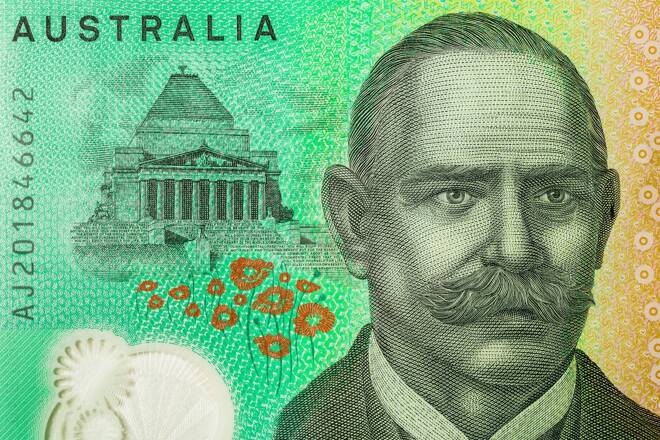Advertisement
Advertisement
AUD to USD Forecast: Inflation Data Crucial for the RBA and the Aussie Dollar
By:
Key Points:
- The AUD/USD gained 0.05% on Tuesday, ending the session at $0.65434.
- On Wednesday, the Australian CPI Report will impact bets on an RBA rate hike and buyer demand for the Aussie dollar.
- Later, US GDP numbers and Fed commentary also need consideration.
Tuesday Overview of the AUD/USD
The AUD/USD gained 0.05% on Tuesday. Partially reversing a 0.35% loss from Monday, the Australian dollar ended the session at $0.65434. The Australian dollar fell to a low of $0.65249 before rising to a high of $0.65578.
Australian Monthly CPI Indicator and the RBA in Focus
On Wednesday, Australian inflation will be under the spotlight. On February 6, RBA Governor Michele Bullock warned the RBA could raise interest rates to tame inflation. Hotter-than-expected inflation numbers for January could fuel bets on a March RBA rate hike.
Economists forecast the annual inflation rate to increase from 3.4% to 3.5% in January.
A more hawkish RBA interest rate trajectory would raise borrowing costs and reduce disposable income. Downward trends in disposable income may curb consumer spending and dampen demand-driven inflation.
Beyond the economic calendar, stimulus chatter from Beijing also needs consideration. Discussions about a meaningful fiscal stimulus package could influence the buyer appetite for the AUD/USD. Fiscal stimulus could drive demand, a boon for the Australian economy and the Aussie dollar.
US Economic Calendar: Q4 GDP and Fed Speakers in Focus
On Wednesday, the US economy will be in the spotlight. 2d estimate GDP numbers for Q4 will garner investor interest. A downward revision to the first estimate may refuel bets on a May Fed rate cut.
According to the first estimate report, the US economy expanded by 3.3% in Q4 after growing by 4.9% in Q3.
Other stats include goods trade data for January. However, the GDP numbers will likely have more impact.
Beyond the stats, FOMC member speeches also need consideration. FOMC members Raphael Bostic, Susan Collins, and Fed Vice Chair John Williams are on the calendar to speak. Views on the economy, inflation, and the timeline for a Fed rate cut would move the dial.
Short-Term Forecast
Short-term AUD/USD trends will likely hinge on the Australian and US inflation numbers. Divergence in inflation trends could materially influence buyer demand for the AUD/USD. Fiscal stimulus from Beijing also needs consideration.
AUD/USD Price Action
Daily Chart
The AUD/USD sat below the 50-day and 200-day EMAs, sending bearish price signals.
An Aussie dollar break above the 50-day EMA would support a move to the 200-day EMA. A breakout from the 200-day EMA would give the bull a run at the $0.66162 resistance level.
Australian inflation, China stimulus chatter, US GDP, and Fed speakers warrant investor attention.
However, rejection at the 50-day EMA would bring the $0.64900 support level into play.
A 14-period Daily RSI reading of 47.80 suggests an AUD/USD break below the $0.64900 support level before entering oversold territory.
4-Hourly Chart
The AUD/USD sat below the 50-day and 200-day EMAs, affirming bearish price signals.
An AUD/USD break above the 50-day and 200-day EMAs would give the bulls a run at the $0.66162 resistance level.
However, a failure to break above the 50-day EMA would give the bears a run at the $0.64900 support level.
The 14-period 4-Hourly RSI at 47.58 suggests an AUD/USD fall to the $0.64900 support level before entering oversold territory.
About the Author
Bob Masonauthor
With over 28 years of experience in the financial industry, Bob has worked with various global rating agencies and multinational banks. Currently he is covering currencies, commodities, alternative asset classes and global equities, focusing mostly on European and Asian markets.
Advertisement
